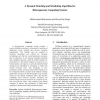Free Online Productivity Tools
i2Speak
i2Symbol
i2OCR
iTex2Img
iWeb2Print
iWeb2Shot
i2Type
iPdf2Split
iPdf2Merge
i2Bopomofo
i2Arabic
i2Style
i2Image
i2PDF
iLatex2Rtf
Sci2ools
137
click to vote
HCW
1998
IEEE
1998
IEEE
A Dynamic Matching and Scheduling Algorithm for Heterogeneous Computing Systems
A heterogeneous computing system provides a variety of different machines, orchestrated to perform an application whose subtasks have diverse execution requirements. The subtasks must be assigned to machines (matching) and ordered for execution (scheduling) such that the overall application execution time is minimized. A new dynamic mapping (matching and scheduling) heuristic called the hybrid remapper is presented here. The hybrid remapper is based on a centralized policy and improves a statically obtained initial matching and scheduling by remapping to reduce the overall execution time. The remapping is nonpreemptive and the execution of the hybrid remapper can be overlapped with the execution of the subtasks. During application execution, the hybrid remapper uses run-time values for the subtask completion times and machine availability times whenever possible. Therefore, the hybrid remapper bases its decisions on a mixture of runtime and expected values. The potential of the hybrid...
Application Execution | Distributed And Parallel Computing | Execution Time | HCW 1998 | Hybrid Remapper |
Related Content
| Added | 04 Aug 2010 |
| Updated | 04 Aug 2010 |
| Type | Conference |
| Year | 1998 |
| Where | HCW |
| Authors | Muthucumaru Maheswaran, Howard Jay Siegel |
Comments (0)

